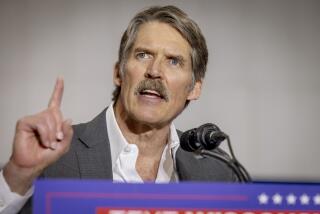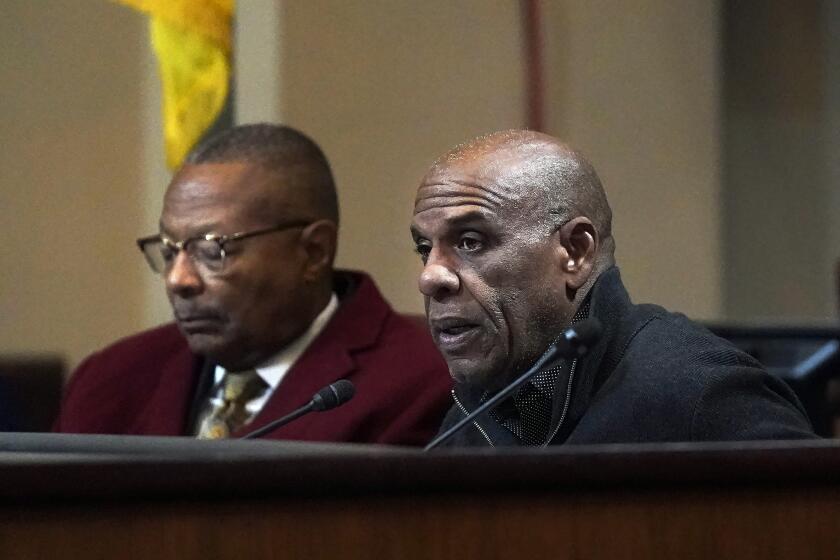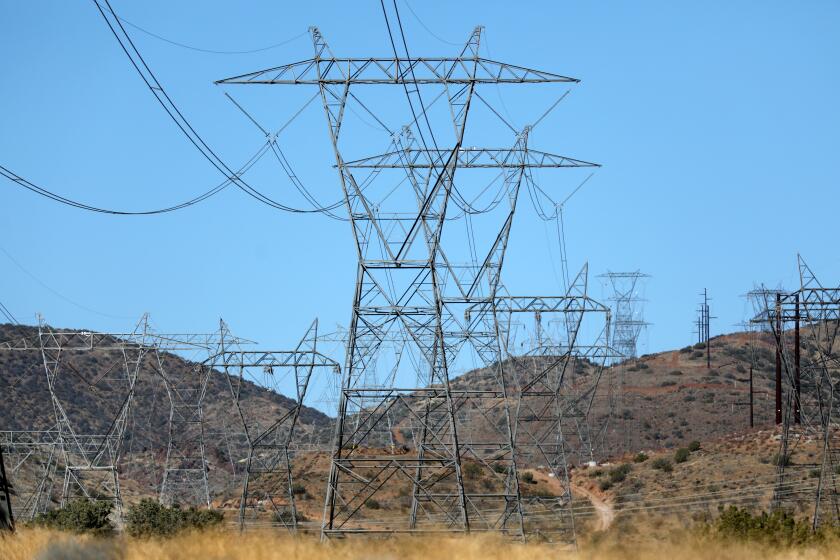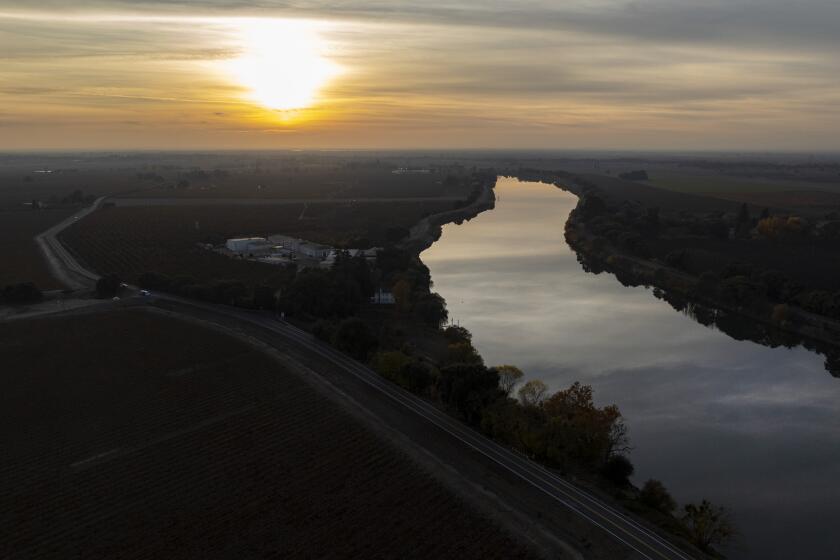Racetracks Sue Over Gov.’s Indian Casino Deals
Racetracks that want to add slot machines to their enterprises through a November ballot measure filed a lawsuit Thursday aimed at derailing Gov. Arnold Schwarzenegger’s deals granting five Indian tribes the right to unlimited numbers of slots.
Tracks and card rooms backing Proposition 68 also announced a statewide television ad blitz beginning today in support of the initiative, which could end tribes’ monopoly on Las Vegas-style gambling in the state.
A competing measure, Proposition 70, would cement the tribes’ monopoly and lift caps on the number of slot machines permitted on their land.
With less than seven weeks left before the election, both sides of the Proposition 68 fight have raised nearly $70 million as they wage what could turn out to be the costliest initiative battle in state history.
The most expensive initiative fight in California involved Proposition 5, a 1998 measure aimed at legalizing Indian casinos. That campaign cost nearly $100 million. Voters passed the measure, but the state Supreme Court struck it down.
In 2000, voters overwhelmingly passed Proposition 1A, ratifying gambling pacts that former Gov. Gray Davis struck with dozens of tribes. The tribes spent about $24 million campaigning for that measure, on which they faced little opposition.
Thursday’s lawsuit was filed in Alameda County Superior Court against the Schwarzenegger administration and the state, attacking pacts that the governor struck with the tribes in June and subsequently ratified by the Legislature.
The deals grant the Rumsey Band and United Auburn Indian Community in the Sacramento area and the Viejas, Pala and Pauma bands in San Diego County the right to operate casinos of any size. In exchange, the tribes agreed to pay the state $1 billion this year and make annual payments of as much as $150 million in coming years.
The lawsuit cites a little-known clause in the California Constitution related to so-called urgency statutes -- the type used to implement the tribal deals in June. Such measures must be approved by a two-thirds vote of the Legislature, and they take effect immediately.
The state Constitution says urgency clauses cannot “grant any franchise or special privilege or create any vested right or interest.”
The attorney who brought the suit, Steven L. Mayer, said the Schwarzenegger deals granted the five tribes at least three special rights:
* The right to install as many slot machines as they wish, unlike other tribes that are limited to 2,000 slots under accords they signed with former Gov. Davis.
* The exclusive right to operate slot machines in their area -- essentially barring commercial interests such as racetracks and card rooms from gaining slot machines for the 18-year life of the compacts.
* The specific right to sue to block any ballot measure from taking effect that authorizes racetracks and card clubs to have slot machines.
“This lawsuit challenges the fact that the public’s right to vote on gaming issues has been taken away for a long, long time,” said Rick Baedeker, president of Hollywood Park racetrack, one of the plaintiffs and a major backer of Proposition 68.
Baedeker said that if the situation were reversed and the tracks had gained exclusive rights to operate slot machines, there would have been a major political reaction. Instead, he added, “we seem to have to be politically correct here, and I don’t understand it.”
Schwarzenegger spokesman Vince Sollitto dismissed the lawsuit as “a desperate attempt by a losing campaign.”
“This suit is as flawed as Proposition 68,” Sollitto said.
He said voters -- not the governor -- gave tribes the exclusive right to operate Nevada-style casinos by approving Proposition 1A. “The governor’s compacts simply make the terms better for California,” he said.
Garry South, a consultant to several tribes mounting a campaign against Proposition 68, called it ironic that if voters approve the initiative, five tracks and 11 card rooms would gain the “exclusive right” to operate 30,000 slot machines.
“And they’re accusing the tribes of being self-interested? That’s laughable,” South said.
Proposition 68 says that if any tribe refuses to pay 25% of its casino profits to local government programs and meet several other requirements, five racetracks and 11 card rooms would gain the right to operate 30,000 slot machines. They would pay local government 33% of their gross profits -- estimated at more than $1 billion a year.
Voters on Nov. 2 also will decide Proposition 70, which would allow unlimited casino expansion on tribal land and maintain Indians’ monopoly on slot machines. In exchange, tribes would pay the state 8.84% of their net revenue, equivalent to California’s corporate tax.
Tribes backing Proposition 70 have not yet begun airing their television advertisements.
The tracks and card rooms are spending $3 million to air their Proposition 68 ad in the coming week. The spot includes no explanation of Proposition 68, but attacks tribes for failing to pay state taxes on the billions they make from their casinos.
The ad features actors questioning the purpose of Indian gambling. “When did it stop being a serious attempt to help poor Indians,” one of the actors asks, “and turn into a game of political money and power?” The ad says tribes make billions “but pay no state taxes.”
“You pay your fair share,” it says. “Why don’t they?”
Proposition 68 spokesman Greg Larsen said racetrack owners filed the suit on their own to limit its complexity. He said the decision did not reflect a falling out between tracks and card rooms.
Together, they have raised $22.4 million for Proposition 68. As of Thursday, the largest single donor, at $3.4 million, was Las Vegas-based Pinnacle Entertainment, which operates a card room at Hollywood Park.
Owners of the Hollywood Park, Los Alamitos, Bay Meadows and Golden Gate Fields racetracks have given $2.4 million each. Two card rooms, the California Commerce Club in Commerce and the Bicycle Club in Bell Gardens, have chipped in $2.35 million each.
But tribes opposing Proposition 68 have raised the most so far -- $27 million, including $6 million each from the Pala, United Auburn and Rumsey Indian groups.
Backers of Proposition 70 reported raising $18.77 million. The San Manuel Band of Mission Indians, which owns a large casino outside San Bernardino, gave $10 million. The Agua Caliente Band of Cahuilla Indians, which has casinos in the Palm Springs area, gave $8.7 million.
More to Read
Get the L.A. Times Politics newsletter
Deeply reported insights into legislation, politics and policy from Sacramento, Washington and beyond. In your inbox three times per week.
You may occasionally receive promotional content from the Los Angeles Times.






